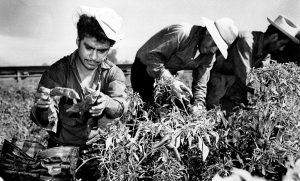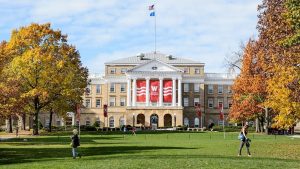University of Wisconsin – Madison Joins RCC Campus Network
As the foliage turned red and gold in October, RCC President & CEO Dr. Robert K. Musil was the invited lecturer for the Weston Roundtable of the Nelson Institute for Environmental Studies at the University of Wisconsin in Madison.
In his talk “Rachel Carson, Wood Pellet Production and Racial Justice,” Musil linked Rachel Carson and the RCC’s campaign to end the clear-cutting of forests to produce industrial scale wood pellets burned to create electricity to the fabled environmental history of the University of Wisconsin. Wisconsin is the home of Aldo Leopold, author of A Sand County Almanac, who studied forestry at Yale and introduced the idea of a land ethic to environmentalism. Leopold was the first professor of environmental management at Wisconsin and mentored Joe Hickey, who became the professor of wildlife management after Leopold. Hickey researched and wrote about the effects of DDT on the eggshells of the Peregrine falcon and other birds — work that he shared with Rachel Carson that informed Silent Spring.
 Leopold also mentored and trained Fran Hamerstrom, his first and only female graduate student, who went on to write numerous books, helped to save the endangered Greater Prairie Chicken, and trained some 7,000 students and volunteers in field study at her unheated old house in the wilds of Wisconsin.
Leopold also mentored and trained Fran Hamerstrom, his first and only female graduate student, who went on to write numerous books, helped to save the endangered Greater Prairie Chicken, and trained some 7,000 students and volunteers in field study at her unheated old house in the wilds of Wisconsin.
This commitment to ecology, a land ethic, and the encouragement and mentoring of a new generation, said Musil, connects directly to the environmental ethic of Rachel Carson who —though usually associated with marine biology and opposition to toxic chemicals, deeply loved the woods around her summer cottage in Maine and tried to save them from being cut down for development.
 Carson would have been horrified, Musil explained, by the clear-cutting of forests and the polluting presence of wood pellet production in the American South, especially in North Carolina which she visited often, wrote about, and loved.
Carson would have been horrified, Musil explained, by the clear-cutting of forests and the polluting presence of wood pellet production in the American South, especially in North Carolina which she visited often, wrote about, and loved.
 But Musil told his audience, Rachel Carson was also deeply concerned about people exposed to pollution and toxins, not just wildlife. In Silent Spring, for instance, Carson writes about how DDT harms not just birds, fish, and insects, but also farmworkers in California. She similarly wrote about the harm to Eskimo mothers and their nursing infants from radioactive fallout produced by U.S. nuclear tests thousands of miles away in Nevada. Carson considered it unfair, unjust, and outrageous that such innocent people would be harmed. Her stand, Musil said, represents an early form of concern for what is now known as environmental justice.
But Musil told his audience, Rachel Carson was also deeply concerned about people exposed to pollution and toxins, not just wildlife. In Silent Spring, for instance, Carson writes about how DDT harms not just birds, fish, and insects, but also farmworkers in California. She similarly wrote about the harm to Eskimo mothers and their nursing infants from radioactive fallout produced by U.S. nuclear tests thousands of miles away in Nevada. Carson considered it unfair, unjust, and outrageous that such innocent people would be harmed. Her stand, Musil said, represents an early form of concern for what is now known as environmental justice.
Musil then described how and where wood pellets are obtained in a few poor counties in North Carolina whose populations are predominately poor and African American. They suffer high rates of asthma, heart disease, and other illnesses connected to the VOCs, particulate matter, and other pollution produced by wood pellet facilities.
In working with local communities, activists, and grassroots coalitions in North Carolina, Musil said, the RCC is carrying out an important part of the legacy of Rachel Carson, while also engaging a whole new generation of young environmental leaders who work for climate and environmental justice through the RCC Fellowship Program which currently supports 29 RCC Fellows with mentoring, training, and a $2,000 stipend.
While at Wisconsin, Musil — who was hosted by long-time UW-Madison professor and member of the RCC National Advisory Council, Dr. Cathy Middlecamp — met with Dean Paul Robbins of the Center for Sustainability and the Global Environment; Andrea Hicks, Director of Sustainability Education and Research; Jonathan Patz, Director of the Center for Global Sustainability and Health; Audrey Stanton of the Office of Sustainability, and a number of other faculty and students. Musil concluded his visit with an intensive seminar and discussion with 15 of Wisconsin’s best environmental interns to offer advice and perspectives on environmental work and careers, on their current studies and projects, and to discuss the RCC Fellowship Program and invite them to apply.
Following Dr. Musil’s visit, the University of Wisconsin – Madison became the 61st college or university to join the Rachel Carson Council Campus Network.







